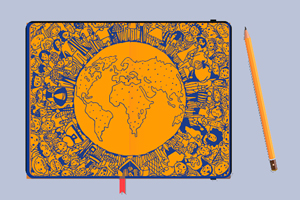
by Ann M. Koenig, AACRAO International staff
May 19, 2020
Well, we knew it would be coming, but it didn’t take long. Two weeks. Two weeks after the AACRAO office in Washington DC closed and our international staff had drafted our first iteration of our COVID-19 protocol for accepting international credential documentation outside of our usual document requirements, the fraudsters arrived. We already had two cases with suspicious documents in the works, but while we were still trying to get adjusted to our new work routines under the shutdown, we received three new cases, within one week. Three! In one week!
This illustrates one of the important points we share with colleagues when we do our international credential evaluation fraud training – fraudsters are opportunists. How many reports and warnings about COVID-19 scams are we hearing and reading about now? Rip-off artists are everywhere, in every sector, aiming to capitalize on disruption, confusion, despair, desperation… preying on the vulnerable. COVID-19 is yet another opportunity for scammers.
Scam behavior exists in our professional sector. I wish more colleagues were aware of that! Because of the disruption to our usual routines and due diligence, fraudsters see an opportunity to get a foot in the door at our institutions. Fraud is basically misrepresentation seeking a reward for something that the fraudster can’t gain legitimately. Examples include:
- Freshman admission based on inauthentic high school records,
- Financial aid based on fraudulent financial documentation
- Transfer credit or graduate admission based on transcripts purchased from an online business calling itself a “university”
- An I-20 form based on manufactured bank records or a counterfeit transcript from a real institution abroad
Our three current cases represent classic scenarios of academic credential fraud. One is a “diploma mill” that sounds like it could be a real university in the United States, “Madison University." The “transcript” is printed on the same kind of transcript security paper that real universities in the United States use. At first glance, it looks OK.
One is a “diploma mill” whose name wants us to think it is a prestigious institution of higher learning in the United Kingdom. Wouldn’t the name “The Trinity College & University” make you think you are dealing with an esteemed British institution? But the documents presented look nothing like what we’d see from any real, legitimate higher education institution with the name “Trinity” in it, anywhere in the world, and they can be purchased online.
The third case involves questions about the origin of suspicious documentation. If it really was shipped by a courier directly by the issuing institution, as the applicant claims, why does the courier tracking record show such a circuitous route for the packet, from the location of the institution in the Caribbean to us? Why did the courier packet first go to two destinations in Europe, then to two cities in the United States, when through one phone call, we got confirmation from the courier that all shipments from that Caribbean location are flown directly to a hub in the United States? What is the real story behind the origin of that transcript? The shipment happened before the COVID-19 shutdowns, so now we will have to wait to investigate further. When it comes to fraud, acting quickly to squelch the problem is important. But for now, this case is on hold.
Whatever the reason the fraudsters might appear on our doorstep, they want something from our institutions that has value to them, but they don’t have what is required to get it. Do they think that we are not paying attention? Do they think that we have relaxed our due diligence because we are distracted by the changes in our work style, demands from family, worries about our finances, concerns about our health, uncertainty about the future? All of these distractions are legitimate! And the fraudsters know it.
Now is the time to double down on due diligence, not relax it. We can’t let our guard down. One fraudster who slips through the cracks, who gains admission or transfer credit or a degree based on fraudulent records, who is receiving financial aid or becomes a teaching assistant or is present in any way on our campus, can cause us nightmares into the future.
I hope you'll join my colleague Julia Funaki and me for the AACRAO Coffee Break session “Protecting Your Institution from Academic Fraud” -- May 29 at 2PM ET.
We are looking forward to a good discussion. As busy as all of us are, we all need a reminder about this, and support from each other! Yes, THIS – FRAUD - on top of everything else!! I know that we talk about “flexibility” in times like this, when we need to consider alternatives to our usual policies and procedures. But that flexibility needs to be rooted in best practice and due diligence. At this time, when we are so concerned about protecting ourselves and our loved ones, we also need to be protecting our institutions. From fraud.
Reminder to self – for today and every day for a time to come:
Best practice. Due diligence.
Know what is going on.
Know what is possible.
Decide what is acceptable.
Be flexible.
So far, so good… (Knuckles to forehead – knock on wood!)